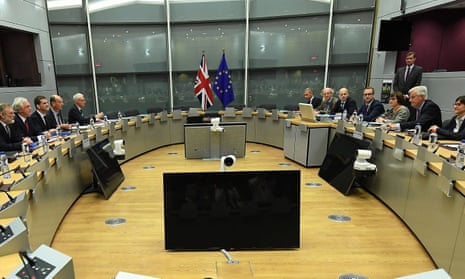Brexit talks have begun in Brussels. The lead negotiators, David Davis and Michel Barnier, representing the UK and the European commission respectively, posed for the cameras before several hours of initial discussions.
Amid concerns that political uncertainty in Britain could delay meaningful negotiations, the two leaders stressed their opening day on Monday would mainly deal with the timing and structure of the divorce talks, which the EU insists cannot yet deal with issues of trade.
“We must first tackle the uncertainties caused by Brexit: first for citizens but also for beneficiaries of EU policies and the impact on borders – in particular Ireland,” said Barnier. “I hope today we can identify priorities and the timetable that would allow me to report to the European council later this week that we had a constructive start.”
Davis, the UK’s Brexit secretary, struck a more upbeat tone, grinning for the cameras before insisting that recent terrorist attacks and fires in Europe showed how the continent could still come together in moments of crisis.
“It is at testing times like these that we are reminded of the values and resolve that we share with our closest allies in Europe,” said Davis. “There is more that unites us than divides us.”
“We are starting with a positive and constructive tone, determined to build a strong and special relationship,” he added.
Barnier and Davis, who last met briefly in November, appeared relaxed and were on first-name terms, but the two sides begin discussions poles apart on a host of contentious issues, particularly the size of any Brexit settlement and the compatibility of Britain’s trade ambitions with EU law on immigration.
The most important opportunity to develop some personal chemistry between Barnier and Davis is likely to come during a 15-minute one-on-one meeting around noon, before they are joined by a couple of officials each for a private lunch. Otherwise the plenary session will take place with up to a dozen advisers on each side.
Davis, who flew in from London on Monday morning, is expected to leave Brussels shortly after the talks for another meeting in Europe, leaving little opportunity for engagement outside the formal context of the negotiations. But officials stress that the opening day is mainly to demonstrate that Brexit remains on track. “The most important thing is the fact that we are here,” said one Whitehall official.
Privately, the British team concedes it will largely have to acquiesce to EU demands for trade to be left off the agenda for now, although it stresses that no final deal can be reached before all aspects of the future relationship are also considered.
An opening session of talks, during which Davis and Barnier sat down together for the first time to formally negotiate terms of the UK’s withdrawal, started shortly after 11am local time (10am BST).
Barnier and Davis will scope out a timetable for the negotiations during a 90-minute session, before taking an early working lunch.
In the afternoon, officials from both sides will spend about two-and-a-half hours in working groups responding to any agreement from the two principal negotiators, and working up a detailed plan.
The most senior officials coordinating the negotiations, Sabine Weyand, who is the European commission’s deputy chief negotiator, and Olly Robbins, the permanent secretary at the Department for Exiting the EU, will also meet in the afternoon.
A closing session between Barnier and Davis will start at 5.30pm, before they again emerge to brief the world’s media at a press conference in the European commission’s Berlaymont building.
Earlier, the British foreign secretary, Boris Johnson, said a Brexit deal could be sealed with “profit and honour” on both sides.
“Obviously this is the first day of the talks on Brexit and I think the most important thing is we should all start – of course there’ll be lots of discussions about the nature of the deal we are going to do – but I think we should also enter on the discussion about money and so forth,” he said.
“But I think the most important think about us now is for us to look to the horizon. Raise our eyes to the horizon. Think about the future. Think about the new partnership. The deep and special partnership that we want to build with our friends and I think in the long run this will be good for the UK and good for the rest of Europe. That’s we are hoping for.”
Johnson, who has previously described the estimated bills emerging from Brussels as “absurd”, said: “I think the whole thing, the whole process, will lead to a happy resolution that I think can be done with profit and with honour for both side and that’s what we’re aiming for.”
Guy Verhofstadt, the European parliament’s coordinator on Brexit, welcomed the British decision not to contest the EU’s negotiating timetable, after Davis retreated from his earlier declaration that it would be “the row of the summer”.
“I am glad that we are sticking to the negotiating timetable, which is already quite tight,” Verhofstadt said. “Let’s now, first of all, make progress in the field of citizens’ rights and create legal certainty for both our people and our companies.”
Didier Reynders, Belgium’s foreign minister, welcomed the start of Brexit talks, but made clear EU leaders remained uncertain about the UK’s goals. “We are waiting for a clear British position,” he said.
